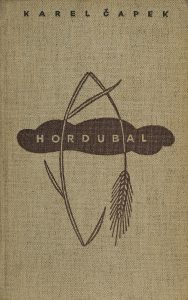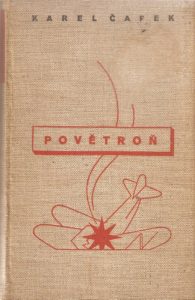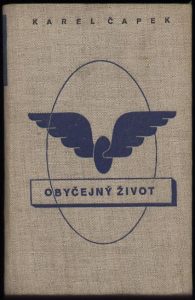A shocking murder disrupts the placid surface of a small Bohemian farming community. The mangled body of an air-crash survivor lies in a coma, anonymous to the hospital workers trying to save his life. An elderly man recounts the story of his youth, belatedly realizing all the possibilities that his life’s decisions foreclosed.
These are the capsule summaries of three otherwise unrelated novels, nevertheless published as a trilogy in 1933–34, from Czechoslovakia’s foremost science fiction writer. Karel Čapek was then best known as the playwright behind R.U.R. (which gave us the word “robot”), the author of dystopian novels like Krakatit and Factory of the Absolute, and the creator of playful detective stories in which the mysteries grew increasingly abstract as the collection progressed (an also an essayist, philosopher, interviewer, gardener, etc. etc.). He had never written large-scale prose works outside of science fiction, and his plan here was an ambitious one: to dramatize the inherent paradoxes of human being as understood in his evolving philosophical worldview.
“Dramatize” is the key word here. Čapek wrote a number of short works on philosophy, but he was first and foremost an artist, and his ability to put that philosophy into practice is what made his fiction some of the most bracing in any language during the European interwar period. The first novel of the trilogy, Hordubal, is a brilliant crime drama whose philosophical interests are never stated directly. The Meteor attempts to approach these issues through a series of limited narrators, each of whom seems to grasp parts of the problem without being able to see the whole. The narrator of An Ordinary Life sees them only in relation to himself. All three books taken together provide a kind of parallax view of Čapek’s major concerns: who are we in relation to the universe, to others, and to ourselves? And given this, how do we move through life as moral actors?
 In Hordubal, perspective is a crucial element for how we understand the nature of justice on a moral plane. Based on a real-life crime, the novel traces the return home of a peasant laborer who is eventually murdered by his wife and the lover she took in his absence. Crucially, the novel is divided into three parts, each with a different perspective: the first part is from Hordubal’s own as he comes back to the village and tries to reconstitute the life he always wanted after his failure to make a fortune in America. The second is from the perspective of the police detectives investigating his murder. The third is from the courtroom as it reviews evidence and reaches its verdict.
In Hordubal, perspective is a crucial element for how we understand the nature of justice on a moral plane. Based on a real-life crime, the novel traces the return home of a peasant laborer who is eventually murdered by his wife and the lover she took in his absence. Crucially, the novel is divided into three parts, each with a different perspective: the first part is from Hordubal’s own as he comes back to the village and tries to reconstitute the life he always wanted after his failure to make a fortune in America. The second is from the perspective of the police detectives investigating his murder. The third is from the courtroom as it reviews evidence and reaches its verdict.
The relationship between truth and justice is a staple of noir and it’s rarely been handled in such a sophisticated way as here. In the end, the jury seems to have come to the (mostly) right decision, but maybe not for the right reasons, and certainly not in a way that feels like they have a grasp of the fullness of the crime and the players involved. Not having the access to the “true story,” nor to Hordubal’s inner life that we, as readers, were granted in the first part, the courtroom feels like it will never fully understand what was really at stake. What, then, does justice mean? Is it a purely legalistic concept, or do its executors feel that they are, as the judge admits with some unease after the fact, “passing sentence on something graver than a crime, that we were judging sin”?
Our inability to bridge that gap doesn’t mean that we should succumb to nihilism. In his afterward to the trilogy, Čapek acknowledges the challenges but finds them even greater reason for a kind of sensitivity to both the necessity of investigation and a humility towards its limitations:
The farther we go [in the story] the more the discrepancies and inconsistencies grate—it is in spite of this, or just for this reason, that the truth must be ascertained. This does not mean that there is no truth, but that it is deeper and weightier, and reality more spacious and more complicated, than we usually admit.
 The Meteor is the least linear of the three novels, and also the most experimental in form and design. When a small passenger plane crashes in a fiery explosion, taking the life of its pilot and mangling the body of its only passenger, the staff and visitors to a local hospital view the wounded survivor with great curiosity. His documents were burned up in the crash, with only a few pieces of evidence remaining that might give some insight into his identity: a tattoo, some foreign coins, a bad case of yellow fever that must have been contracted somewhere in the tropics, etc. Everyone has their own theory about who this mystery patient may be (If this setup sounds familiar, well…)
The Meteor is the least linear of the three novels, and also the most experimental in form and design. When a small passenger plane crashes in a fiery explosion, taking the life of its pilot and mangling the body of its only passenger, the staff and visitors to a local hospital view the wounded survivor with great curiosity. His documents were burned up in the crash, with only a few pieces of evidence remaining that might give some insight into his identity: a tattoo, some foreign coins, a bad case of yellow fever that must have been contracted somewhere in the tropics, etc. Everyone has their own theory about who this mystery patient may be (If this setup sounds familiar, well…)
And that’s as far as it gets. The coma is irreversible, the yellow fever is destroying his body, he will not survive and is unlikely to regain consciousness before he passes, and the best anyone can do is construct fanciful (but possibly accurate in certain crucial ways?) narratives about who this person is and what he was doing in the sky that fateful night. The novel jumps between perspectives as different visitors (another patient who is also a poet, an attending nurse, a self-described “clairvoyant”) piece together the story of a nearly blank-slate man, in the process leaking aspects of their own lives and perspectives into the one they are projecting, and maybe having that life experience leak back into themselves.
Once again, Čapek is on hand to encourage us away from epistemic despair:
Our knowledge of people is generally restricted to allotting them a definite place in our life systems… Whatever we look at is that thing and, at the same time, something of us, something of ours, something personal; our knowledge of the world and of men is like a confession. We see things differently according to who and what we are… But [reality seen this way] is no longer a chaos, it is an abundance, a distinct plurality; it is no longer an uncertainty, but a polyphony.
 The trilogy concludes with An Ordinary Life, a kind of autobiographical performance by a retired train-station worker aware of his declining health and impending death. Most of the book would stand as an excellent example of the memoir form, a charming and engagingly written nostalgia piece about a world that no longer exists, but then Čapek ups the ante considerably: deep into his story, the narrator’s nagging doubts interrupt and launch a dialogue with the story he’s telling. How accurate his memory? Is he remembering certain moments as they happened or as he would like them to have happened? Is his interpretation of his life getting in the way of his recounting of events?
The trilogy concludes with An Ordinary Life, a kind of autobiographical performance by a retired train-station worker aware of his declining health and impending death. Most of the book would stand as an excellent example of the memoir form, a charming and engagingly written nostalgia piece about a world that no longer exists, but then Čapek ups the ante considerably: deep into his story, the narrator’s nagging doubts interrupt and launch a dialogue with the story he’s telling. How accurate his memory? Is he remembering certain moments as they happened or as he would like them to have happened? Is his interpretation of his life getting in the way of his recounting of events?
Most importantly, what if? What if he hadn’t taken a certain job, or proposed to a certain woman, or made a certain choice that he made along the way? Who is this other person, this self who lived an entirely different life that was possible for him at one point but foreclosed somewhere along the way? These aren’t just the idle questions of a dying man, Čapek argues, but the most essential way that we ultimately come into the kind of understanding of ourselves that makes our understanding of others possible:
And here too we find this plurality: a man is a host of real and possible persons—and at first glance it looks like a worse confusion, like the disintegration of a man who has torn himself to bits and thrown his I to the winds. Only at this point did it become clear to the author: it’s all in order; the reason we can apprehend and understand plurality is that we ourselves are such a plurality.
“Noetic” comes from nous, the Greek root for intellect that implies an active engagement of the mind. In Čapek’s use, it means a way of cognizing the world and ourselves in the world, of understanding ourselves both as individuals and as parts of a larger universe, as thinking subject and as objects of other people’s thought, as subjective viewpoints in an objective world. On the latter point, Čapek was heavily influenced by pragmatism, not in the contemporary political sense but in the early 20th-century philosophical sense. He read American philosophers like William James and wrote his own tract on pragmatism, its pros and cons, for Czech readers. The key point he took from pragmatism is how it foregrounds a need for understanding the role of subjectivity in our eternal grasping for objective truth.
Because of his insistence that viewpoints are inherently and necessarily subjective, he was sometimes criticized as a relativist, but this makes little sense either in his fiction or in his life, where e.g. he identified and condemned fascism and Nazism a lot more quickly and vocally than many of his European peers (to the point that he was on a target list for arrests when Nazi Germany invaded Czechoslovakia; he succumbed to illness before they arrived at his home.) It’d be more accurate to say that Čapek believed objectivity is always filtered through subjectivity, and the way to truth is not ignore the latter but to understand how it impacts our relationship to the former. Objective information does exist, and though it cannot overcome the limitations of individual subjectivity, the movement towards objective fact can draw us closer into areas of practical need, like building consensus for decision-making.
This was a crucial stance in interwar Czechoslovakia, where the relatively new country (the first World War gave it its independence after centuries of rule by the Austrian empire) found itself both at the geographical and ideological crossroads of Europe, nestled uncomfortably between rampaging capitalism to its West and imperial communism to its East, meanwhile dealing with its own nascent nationalisms, all creating a murky stew of -isms that Čapek’s friend and the country’s first president, Tomáš Masaryk, had tried to steer the infant democracy through. Čapek’s task is thus to justify a moral engagement with subjectivity, one that welcomes a plurality of viewpoints while also refusing admission to destructive, anti-human ideologies like fascism and Nazism. The novels never deal with the latter directly (he’d save that for his masterpiece, War with the Newts), as they aim to provide a moral ground for these discussions, a humanist approach to knowledge in a world where our faith in objectivity has been shaken, a world threatened on all sides by totalizing abstractions.
But this all makes the novels seem far headier than they read in practice. Hordubal is a brilliant crime novel that ends on a brush with the absolute, with a “stillness of the soul,” and not without a touch of bitter irony. The Meteor is a fantastic (and fantastical) extension of the possibilities of narrative, a story being written by its own characters in the process of becoming. An Ordinary Life is a delicate and at times savage treatment of the whole genre of memoir, at various times funny and touching and deeply, deeply sad. This trilogy would have assured Čapek a place in literary history even if he hadn’t given us robot uprisings and metaphysical detectives and sentient salamanders. That he gave us all of these things is some kind of miracle.
Sources:
Lynn Badia, “The Absolute Indeterminacy of Karel Čapek’s Science Fiction,” Open Library of Humanities, 2019, vol. 5(1).
Czech Philosophy in the XXth Century, ed. Lubomír Nový, Jiří Gabriel, and Jaroslav Hroch (Paideia Press, 1994).
Ivan Klíma, Karel Čapek: Life and Work, trans. Norma Comrada (Catbird Press, 2002).
Benjamin Paloff, Lost in the Shadow of the Word: Space, Time and Freedom in Interwar Eastern Europe (Northwestern University Press, 2016).
* The cover images are from the Polish translations published by Wiedza in 1948.
* The English translations used above come from Three Novels; Hordubal, Meteor, An Ordinary Life, trans. M. and R. Weatherall (Catbird Press, 1990). I don’t particularly like this translation, but it’s the only readily available version of the books in English.

